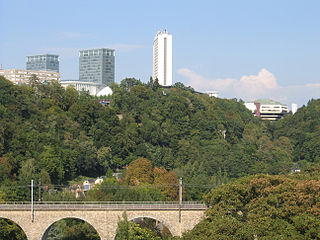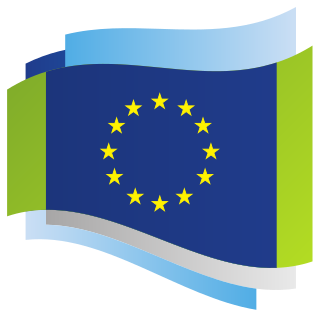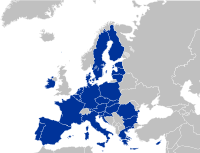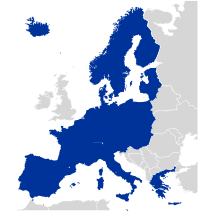
The Common Foreign and Security Policy (CFSP) is the organised, agreed foreign policy of the European Union (EU) for mainly security and defence diplomacy and actions. CFSP deals only with a specific part of the EU's external relations, which domains include mainly Trade and Commercial Policy and other areas such as funding to third countries, etc. Decisions require unanimity among member states in the Council of the European Union, but once agreed, certain aspects can be further decided by qualified majority voting. Foreign policy is chaired and represented by the EU's High Representative, currently Josep Borrell.

The High Representative of the Union for Foreign Affairs and Security Policy (HR/VP) is the chief co-ordinator and representative of the Common Foreign and Security Policy (CFSP) within the European Union (EU). The position is currently held by Josep Borrell.

The Secretariat of the European Parliament is the administrative body of the European Parliament headed by a Secretary-General. It is based in the Kirchberg district of Luxembourg City and around the Brussels-Luxembourg Station in Brussels and employs 4000 officials.

The European Defence Agency (EDA) is an agency of the European Union (EU) that promotes and facilitates integration between member states within the EU's Common Security and Defence Policy (CSDP). The EDA is headed by the High Representative (HR/VP), and reports to the Council. The EDA was established on 12 July 2004 and is based in the Kortenberg building in Brussels, Belgium, along with a number of other CSDP bodies.

The Military Staff of the European Union (EUMS) is the directorate-general of the European Union's (EU) External Action Service (EEAS) that contributes to the EU's Common Security and Defence Policy (CSDP) by providing strategic advice to the High Representative (HR/VP) and commanding operations through its Military Planning and Conduct Capability (MPCC) operational headquarters. From the end of 2020 the MPCC will also be capable of running executive operations of up to 2500 troops, i.e. the size of one battle group, as well as 3 non-executive missions.
The European Union Special Representatives (EUSR) are emissaries of the European Union with specific tasks abroad. While the EU's ambassadors are responsible for affairs with a single country, Special Representatives tackle specific issues, conflict areas or regions of countries. They answer directly to the High Representative of the Union for Foreign Affairs and Security Policy, currently Josep Borrell.
The Directorate-General for the External Relations was a Directorate-General of the European Commission, responsible for the external policy. The DG was merged into the European External Action Service in 2010, then headed by High Representative Catherine Ashton.

The European Commissioner for External Relations was a member of the European Commission with responsibility over the Commissions external representation in the world and the European Union's (EU) Neighbourhood Policy (ENP). The responsibility was shared though between other Commission posts and the High Representative.

The Directorate-General for International Partnerships is one of the departments of the European Commission. It operates under the authority of the European Commissioner for International Partnerships, Jutta Urpilainen.

David O'Sullivan is a European civil servant from Ireland who served as Ambassador of the European Union to the United States from 2014 to 2019, Chief Operating Officer of the EEAS from 2010 to 2014, Director-General of DG RELEX from October 2010 to December 2010, Director-General of DG Trade from 2005 to 2010, Secretary General of the European Commission from 2000 to 2005.
The Instrument for Stability is a financial and political instrument at the disposal of the European Union. It is prepared at strategic level by the EEAS and implemented by the European Commission. The objective is three-fold:
- Respond to urgent needs due to political instability or a major disaster;
- Build the conditions for long term stability in particular by addressing some major risks and threats that prevent political security and economic development, such as terrorism, organized crime, illicit trafficking, chemical-biological-nuclear risks but also new challenges such as pandemics, cybercrime, climate change or the protection of critical infrastructure;
- Participate to the crisis management cycle by supporting CSDP operations and by contributing to restore stability after the crisis or the conflict.

The European External Action Service (EEAS) is the diplomatic service and combined foreign and defence ministry of the European Union (EU). The EEAS is led by the High Representative for Foreign Affairs and Security Policy (HR), who is also President of the Foreign Affairs Council and Vice-President of the European Commission, and carries out the EU's Common Foreign and Security Policy (CFSP), including the Common Security and Defence Policy (CSDP).

The European Union Operations Centre was an ad-hoc, non-standing, non-commanding headquarters facilitating the planning and conduct of military operations deployed as part of the European Union's (EU) Common Security and Defence Policy (CFSP) that was active between 2012 and 2016.

European Union–Pakistan relations are the international relations between the common foreign policy and trade relations of the European Union and the Islamic Republic of Pakistan.

The seat of the European External Action Service is the office building on Schuman roundabout in the heart of the European Quarter of Brussels, Belgium, in which most of the European External Action Service (EEAS) resides. The building also houses some other EU departments. The EEAS staff moved into the building in February 2012.

Angelina Julietta Francisca Eichhorst is a Dutch diplomat and European civil servant, currently serving as Managing Director for Europe and Central Asia at the European External Action Service (EEAS) in Brussels, Belgium.

The EU Centres of Excellence on Chemical, Biological, Radiological and Nuclear Risk Mitigation is an initiative of the European Union which was launched in 2010. The Initiative addresses the mitigation of and preparedness for risks related to CBRN material and agents. The origin of these risks can be criminal, accidental or natural. The CBRN CoE Initiative seeks to boost cooperation at national, regional and international levels, and to develop a common and coherent CBRN risk mitigation policy at national and regional level. Risk mitigation comprises prevention, preparedness and post-crisis management.
Florika Fink-Hooijer is a European civil servant at the European Commission. She leads the Directorate General for the Environment, which holds large responsibilities under the European Green Deal.

This article outlines the present structure of the European Union's Common Security and Defence Policy (CSDP), a part of the Common Foreign and Security Policy (CFSP) based on articles 42–46 of the Treaty on European Union (TEU). Article 42.2 of TEU states that the CSDP includes the 'progressive framing' of a common Union defence policy, and will lead to a common defence, when the European Council of national heads of state or government, acting unanimously, so decides.




















